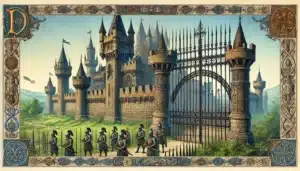At a Glance
- Understanding the Complexity of Iron and Aluminum Fences
- Key Factors to Consider Before Attempting a DIY Installation
- Challenges of Installing Iron and Aluminum Fences
- Benefits of Hiring Professionals for Fence Installation
- Fence Installation FAQs
A well-built, sturdy fence is like the protective armor of a home. It serves as a barrier against intruders, a shield for privacy and a frame that enhances the beauty of the property. But what happens when this armor needs to be installed? Can it be a do-it-yourself project or is it best left to the professionals? This article will delve into the topic of installing iron or aluminum fences – two popular choices for homeowners.
The question in focus here is whether you can install an iron or aluminum fence on your own. The short answer is yes, you can. But should you? That’s where it gets complicated. This is because installing these types of fences is not a simple task; it’s a project that requires a fair amount of skill, knowledge, and experience. Let’s explore why it’s often recommended to use a professional for such installations.
Understanding the Complexity of Iron and Aluminum Fences
Iron and aluminum fences are sought after for their durability, aesthetic appeal, and security features. They are the stalwarts of the fencing world, standing tall and unyielding against weather, time, and external threats. Iron fences are known for their strength and longevity. They can stand up to harsh elements and still maintain their structural integrity. They also have an undeniable aesthetic appeal, adding a classic touch to any property.
Aluminum fences, while not as robust as iron, are resistant to rust and corrosion, making them an excellent choice for those living in areas with high humidity or rainfall. They are also lighter than iron and easier to install, yet they still provide a high level of security.
Iron and aluminum fences are versatile and can be used in a variety of settings. They are ideal for residential properties, commercial properties, parks, and even industrial areas.
In terms of styles, iron fences often feature intricate designs and detailing, lending an air of elegance and sophistication. On the other hand, aluminum fences come in a range of styles from simple and modern to ornate and traditional.
Learn more: Step-By-Step Guide to Installing a Fence on A Slope
Key Factors to Consider Before Attempting a DIY Installation
Before you begin your journey into the world of DIY fence installation, there are some critical factors you need to consider.
- Understanding Property Boundaries and Local Regulations
One of the first steps in any fencing project is understanding your property boundaries. This is crucial because installing a fence on your neighbor’s property could lead to legal issues. Plus, your local city or county probably has rules and regulations about fence installations that you need to follow.
- Assessing Soil Conditions and Potential Obstacles
The condition of your soil can significantly impact the installation process. Rocky or uneven ground can make it difficult to install fence posts properly. You also need to be aware of any underground utilities or obstacles that could interfere with the installation.
- Evaluating Equipment and Tools Needed for Installation
Installing a fence requires more than just a hammer and some nails. You’ll need specific tools and equipment, such as post hole diggers, concrete mix, levelers, and possibly even a vehicle capable of transporting the materials.
- Estimating Time and Effort Required
Finally, you need to consider the time and effort it will take to install the fence. Even for the most skilled DIY enthusiast, installing a fence is a time-consuming task. And if you’re not experienced, it could take even longer than you expect.
Challenges of Installing Iron and Aluminum Fences
Technical Expertise and Knowledge
Have you ever tried to assemble a piece of furniture without reading the instructions? It usually ends up being a frustrating experience, right? Now, imagine doing the same thing but with an iron or aluminum fence. Not so easy, is it?
- Detailed Measurements and Accurate Calculations
Just as a tailor needs precise measurements to make a suit fit perfectly, so too does a fence installer need accurate measurements to ensure the fence fits the property. This involves measuring the length and width of the area where the fence will be installed, accounting for any curves or corners, and calculating how many panels and posts will be needed.
- Proper Techniques for Digging Post Holes and Setting Posts
Digging post holes might seem like a straightforward task, but there’s more to it than meets the eye. The holes must be dug to the correct depth and width, and the posts must be set properly to ensure they are secure and level. This requires knowledge of different soil types and how they affect post stability, as well as understanding how to use tools like a post hole digger and level.
- Understanding Fence Panels and the Intricacies of Assembly
Each fence panel is like a puzzle piece that needs to be assembled and connected in the correct order. This involves understanding how each component — from rails and pickets to brackets and screws — fits together, and following the correct sequence of assembly. It’s kind of like building a Lego set, except the pieces are much bigger and heavier!
Potential Difficulties Encountered During Installation
But wait, there’s more! Just when you thought you had all the pieces of the puzzle, along comes a curveball in the form of unexpected obstacles or issues that can make the installation process even more challenging.
- Dealing With Uneven Terrain and Slopes
Installing a fence on flat ground is one thing, but what happens when you have to deal with slopes or uneven terrain? This adds an extra layer of complexity to the installation process, requiring adjustments to the fence design and installation techniques to ensure the fence remains level and secure.
- Overcoming Obstacle Issues
Remember how we compared installing a fence to assembling a jigsaw puzzle? Well, imagine trying to fit a puzzle piece into place only to find a rock or tree in the way. That’s what it’s like trying to install a fence when there are obstacles like trees, rocks, or underground utilities in the way. These obstacles require careful planning and problem-solving to overcome.
- Ensuring Fence Alignment, Plumbness, and Stability
Just like a skyscraper needs to be perfectly aligned and plumb to stand tall and stable, so too does a fence. This means ensuring each post is perfectly vertical, each panel is perfectly horizontal, and the entire fence is perfectly aligned. Any deviation from this can result in a fence that is unstable or looks crooked.
- Avoiding Common Mistakes and Errors
Even with careful planning and execution, mistakes can happen. These can range from minor errors, like installing a panel upside down, to major blunders, like digging a post hole in the wrong location. Such mistakes can be costly and time-consuming to fix, adding to the overall challenge of installing a fence.
Learn more: What Is Rod Iron?
Benefits of Hiring Professionals for Fence Installation
Expertise and Skills
Ever tried to fix a leaky faucet or assemble a complex piece of furniture on your own? You’ve probably realized that some tasks are best left to the experts, right? The same goes for fence installation. It’s not just about hammering some posts into the ground and attaching panels. It’s a complex process that requires specialized knowledge, skills, and equipment.
- Specialized Knowledge of Iron or Aluminum Fence Installation
Professional fence installers are trained and experienced in working with different types of fences, including iron and aluminum. They understand the intricacies of these materials and the specific techniques required for their installation. It’s like having a personal trainer who specializes in your favorite sport.
- Years of Experience with Various Installation Scenarios
Just as a seasoned sailor can navigate through stormy seas, so too can an experienced fence installer handle various installation scenarios. Whether it’s dealing with uneven terrain, overcoming obstacles, or ensuring perfect alignment, they’ve got it covered.
- Ability to Handle Challenges Efficiently
You know how superheroes always find a way to overcome challenges and save the day? That’s kind of what professional fence installers do. They have the tools and techniques to efficiently handle any challenge that comes their way, ensuring your fence is installed correctly and securely.
Time and Cost Savings
Ever heard the saying, “time is money”? Well, when it comes to fence installation, this couldn’t be more true. By hiring professionals, you can save both time and money.
- Minimizing Potential Errors That Could Lead to Costly Repairs
Remember those common mistakes we talked about earlier? With professional fence installers, you won’t have to worry about them. They’ll ensure the job is done right the first time, saving you from costly repairs down the line.
- Efficient Installation Process to Ensure Timely Completion
Just as a skilled chef can whip up a gourmet meal in no time, so too can a professional fence installer complete the job efficiently. This means you won’t have to wait forever for your fence to be installed.
- Opportunity Cost of Learning and Acquiring Necessary Skills
Instead of spending your time learning how to install a fence, wouldn’t you rather spend it doing something you enjoy? By hiring professionals, you can.
Warranty and Guarantee
Ever bought a product only to have it break down shortly after? It’s frustrating, isn’t it? Well, with professional fence installation, you won’t have to worry about this.
- Professional Installation Often Comes with Warranties
Just like a new car comes with a warranty, so too does a professionally installed fence. This gives you peace of mind knowing that if anything goes wrong, it will be taken care of.
- Reputable Fence Companies Provide Support and Repairs
Ever had a problem with a product and found the company’s customer service to be lacking? It’s not a fun experience, right? Well, reputable fence companies pride themselves on their customer service. They provide support and repairs to ensure your fence stays in great shape.
Remember the protective armor analogy we used at the beginning? Just like a knight wouldn’t go into battle without their armor, your property shouldn’t be left unprotected without a well-installed fence. It’s not just about having a fence; it’s about having one that’s installed correctly, stands strong, and enhances the beauty of your property.
Now, think about the complexity and challenges involved in installing an iron or aluminum fence. It’s not just a simple DIY project you can complete in a weekend. It requires precise measurements, proper techniques, problem-solving skills, and a whole lot of time and effort. It’s kind of like trying to build a castle with a toy hammer and some playdough, isn’t it?
But what if there was a better way? What if you could have your cake and eat it too — have a beautiful, sturdy fence without all the hassle and potential pitfalls of a DIY installation? That’s where professional fence installers come in. They’re like the master chefs of the fencing world, turning raw materials into an exquisite creation that’s both functional and aesthetically pleasing. By hiring professionals, you can save yourself from potential errors, ensure your fence is installed correctly and efficiently, and even enjoy warranties and support. It’s like having a personal trainer, a chef, and a handyman all rolled into one!
So, before you start digging post holes and assembling panels, consider this: isn’t it worth investing in expertise and peace of mind? Don’t gamble with your property’s protection. Consult a professional for your fence installation needs.
Learn more: The Neighborly Way: Understanding Fence Etiquette
Iron Fencing: An Alternative Worth Considering
But what type of fence should you choose? Well, if you’re looking for durability, security, and aesthetic appeal, iron fencing is an excellent choice. It’s like the Rolls Royce of fences — classy, reliable, and sure to turn heads. Iron fences are strong and long-lasting, standing tall against harsh weather conditions. They add a touch of elegance and sophistication to any property, enhancing its curb appeal. And with a variety of styles and designs available, you can find one that perfectly matches your home’s architectural style.
Do you want a fence that not only protects your property but also adds to its beauty? Look no further than Irish Iron. We’re the go-to iron fence installer in Sacramento and surrounding areas.
Why choose us? Because we’re like the fencing wizards, turning ordinary properties into extraordinary ones with our skillfully installed iron fences. We offer professional installation, excellent customer service, and warranties for peace of mind. Plus, we have years of experience and a portfolio of beautiful fences to prove it. So, don’t just settle for any fence, choose an iron fence from Irish Iron. You won’t regret it. Contact us today for all your fencing needs. Let us armor your property with a fence that’s as strong and beautiful as a knight’s armor.
Fence Installation FAQs
Can I install an iron or aluminum fence on my own?
Yes, however, hiring professionals is recommended to ensure a seamless and sturdy result.
What’s the difference between installing an aluminum or iron fence?
The main differences lie in the weight and flexibility of the materials. Aluminum fences are lighter and more flexible, making them easier for DIY installation. Iron fences, on the other hand, are heavier and require more effort to install.
How much does it cost to install an iron or aluminum fence?
The cost of fence installation depends on the size of your yard and the type of fence you choose. On average, aluminum fences cost around $20 to $30 per foot, whereas wrought iron fences tend to be more expensive.
What tools do I need to install an iron or aluminum fence?
You’ll need basic tools like a shovel or post-hole digger for digging holes, a level to ensure your posts are straight, and a wrench or screwdriver for attaching panels to posts.
What are the steps to install an aluminum fence?
Installing an aluminum fence involves several steps: marking your property line, laying out the fence posts, digging post holes, setting the posts, attaching the fence panels, and installing the gate.
Do aluminum fences require maintenance?
Aluminum fences are generally low-maintenance, especially when compared to iron fences. However, they can benefit from occasional cleaning with a mild detergent to remove dirt and grime.
Are there any benefits of DIY fence installation?
Doing it yourself can save you on labor costs, plus it gives you the satisfaction of accomplishing a task on your own.
Are there any downsides to DIY fence installation?
While cost-saving and satisfying, DIY fence installation can be time-consuming and physically demanding. If not done correctly, it could result in a less sturdy fence, which might need more frequent repairs or replacement.
How do I ensure my fence is level and straight?
Using a level during installation is crucial. Always check each post with a spirit level to make sure it’s perfectly vertical before securing it in place. Also, use a string line along the tops of the posts to ensure they’re at the same height.
Can I install a fence on uneven ground?
Yes, but it’s more challenging. You’ll need to either step the panels or use rackable panels that adjust to the slope of the ground. This may require extra work or special materials.



